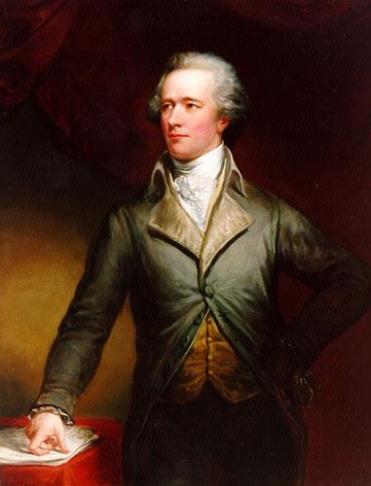RePost- Alexander Hamilton on the Nature of Politics
I have copied excerpts from Hamilton’s essay ‘Defence of the Funding System.’ This is the most eloquent elaboration of the underlying reality of the political world I have yet come across. Much of the essay focuses upon credit and finance, fields in which my understanding is quite unfortunately deficient. I have omitted those (equally elegant) segments, and recorded here chiefly what is of direct value to the student of political theory.
“A prosperous state of agriculture, commerce, and manufactures nourishes and begets opulence, resource, and strength. These, by inspiring a consciousness of power, never fail to beget in the councils of nations, under whatever form of government, pride, ambition, and a sentiment of superiority. These dispositions lead directly to war, and consequently to expense and to all the calamities which march in the train of war. Shall we, therefore, reprobate and reject improvements in agriculture, commerce, and manufactures?
Again the same causes leading to opulence, increasing the means of enjoyment, naturally sharpen the appetite for it, and so promote luxury, extravagance, dissipation, effeminacy, disorders in the moral and political system, convulsions, revolutions, the overthrow of nations and empires. Shall we, therefore, on this account renounce improvements in agriculture, commerce and manufactures?
Again, science, learning, and knowledge promote those momentous discoveries and improvements which accelerate the progress of labor and industry, and with it the accumulation of that opulence which is the parent of so many pleasures and pains, so many blessings and calamities. Shall we, therefore, on this account explode science, learning, and knowledge?
Again, true liberty, by protecting the exertions of talents and industry, and securing to them their justly acquired fruits, tends more powerfully than any other cause to augment the mass of national wealth and to produce the mischiefs of opulence. Shall we, therefore, on this account proscribe liberty also?
What good, in fine, shall we retain? ’T is the portion of man, assigned to him by the eternal allotment of Providence that every good he enjoys shall be alloyed with ills, that every source of his bliss shall be a source of his affliction—except virtue alone, the only unmixed good which is permitted to his temporal condition.
…
Let us then say, as the truth is, not that funding systems produce wars, expenses, and debts, but that the ambition, avarice, revenge, and injustice of man produce them. The seeds of war are sown thickly in the human breast. It is astonishing, after the experience of its having deluged the world with calamities for so many ages, with how great precipitancy and levity nations still rush to arms against each other.
Besides what we see abroad, what have we recently witnessed among ourselves? Never was a thing more manifest than that our true policy lay in cultivating peace with scrupulous care. Never had a nation a stronger interest. Yet how many were there who directly, and indirectly raised and joined in the cry of war. Sympathy with one nation and animosity against another, made it infinitely difficult for the government to steer a course calculated to avoid our being implicated in the volcano, which shook and overwhelmed Europe. Vague speculations about the cause of liberty seconded by angry passions, had like to have plunged this young country, just recovering from the effects of the long and desolating war, which confirmed its revolution, just emerging from a state little short of anarchy; just beginning to establish system and order, to revive credit and confidence, into an abyss of war, confusion, and distress!
After all the experience, which has been had upon the point, shall we still charge upon funding systems evils which are truly chargeable upon the bad and turbulent passions of the human mind?
…
The difference between the true politician and the political empyric is this: the latter will either attempt to travel out of human nature and introduce institutions and projects for which man is not fitted and which perish in the imbecility of their own conception and structure, or without proposing or attempting any substitute they content themselves with exposing and declaiming against the ill sides of things, and with puzzling and embarrassing every practicable scheme of administration which is adopted. The last indeed is the most usual because the easiest course, and it embraces in its practice all those hunters after popularity who, knowing better, make a traffic of the weak sides of the human understanding and passions.
The true politician, on the contrary, takes human nature (and human society its aggregate) as he finds it, a compound of good and ill qualities, of good and ill tendencies, endued with powers and actuated by passions and propensities which blend enjoyment with suffering and make the causes of welfare the causes of misfortune.
With this view of human nature he will not attempt to warp or disturb its natural direction, he will not attempt to promote its happiness by means to which it is not suited, he will not reject the employment of the means which constitute its bliss because they necessarily involve alloy and danger, but he will seek to promote its action according to the bias of his nature, to lead him to the development of his energies according to the scope of his passions, and erecting the social organization on this basis he will favor all those institutions and plans which tend to make men happy according to their natural bent, which multiply the sources of individual enjoyment and increase national resources and strength, taking care to infuse in each case all the ingredients which can be devised as preventives or correctives of the evil which is the eternal concomitant of temporal blessing.”
Full Essay- http://oll.libertyfund.org/?option=com_staticxt&staticfile=show.php%3Ftitle%3D1385&chapter=92677&layout=html&Itemid=27

Recent Comments